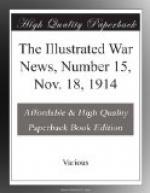Major the Hon. William Cadogan, son of Earl Cadogan, and Equerry to the Prince of Wales, was killed while commanding the 10th Hussars in place of the Colonel, who had been wounded. Major Cadogan had been sharing in the work of the infantry in the trenches. He served in South Africa, and last year accompanied the Prince of Wales, who travelled as the “Earl of Chester,” on a visit to Germany, where our photograph was taken.—[Photograph by Illus. Bureau.]
Besides, they have sources of inspiration—have our “Tommies”—denied to their Teutonic antagonists. General von Kluck, Commander of the First German Army, has described a visit of the dread War Lord to the line of the Aisne “behind the line of fire”; and the “Hochs” with which he was greeted by a Prussian Grenadier regiment. But what are those guttural “Hochs” compared with the ringing cheers which were evoked by the presence of Lord Roberts on the occasion of his last visit to his old comrades-in-arms of the Indian Army, now confronting those Prussian Grenadiers on the line of the Yser? When Lord Roberts was made a Peer, after his march from Cabul to Candahar, he chose as his heraldic supporters a Gurkha and a Gordon Highlander, who had done so much to help him on to victory; and it is pretty certain that he would have desired no more congenial and appropriate manner of death than he has found, at the age of eighty-two, as an inspiring visitor to the lines of the gallant troops of all kinds whom he himself had so often led to victory. It has been said that no man can be called happy until his death, and certainly no one was ever more felicitous in the manner of his end than the veteran hero, the blameless “Bayard” of the British Army, who has well been called one of Ireland’s greatest Englishmen.
Yet his name will continue to serve as an inspiration to the Army which adored him; and doubtless his last moments were soothed by the thought that the soldiers whom he so fervently loved had just added to their laurels by the brave repulse on the Yser of two Brigades, or a Division, of the boasted Prussian Guards, forming the very flower and kernel of the Kaiser’s army. And news also must have reached the conqueror of Paardeburg and Pretoria that the German-prompted and German-paid rebellion against the Union of which he had laid the foundation-stone—not with the trowel of an architect, but with the sword of a soldier—was collapsing under the well-directed blows of such an Imperial patriot and statesman as General Botha, proud to wear the uniform of the hero of Candahar.
Thus the last hours of our veteran Field-Marshal must have been consoled with the reflection that, in spite of the fact of all his warnings and his exhortations having fallen on deaf ears, victory was gilding our arms, as well as those of our Allies, all round; and that the loss of two of our cruisers off the coast of Chile had been more than offsetted by the destruction of the notorious commerce-destroyer Emden in the seas of Sumatra and the cornering of the equally elusive Koenigsberg among the palm-trees of an East African lagoon—fit incident for the pages of Captain Marryat or Mr. George Henty, beloved of the boy-devourers of stirring adventure books.




